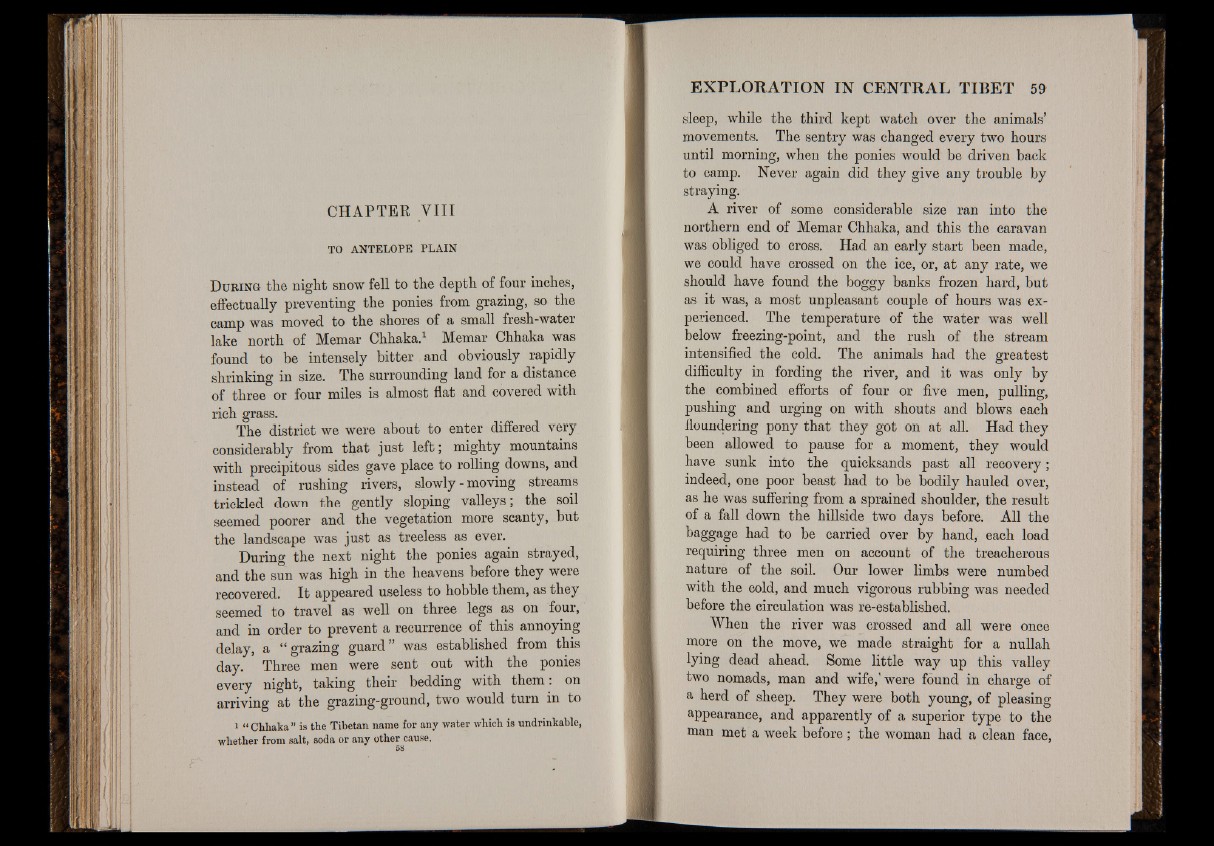
CHAPTER V III
TO ANTELOPE PLAIN
D u r in g the night snow fell to the depth of four inches,
effectually preventing the ponies from grazing, so the
camp was moved to the shores of a small fresh-water
lake north of Memar Chhaka.1 Memar Chhaka was
found to be intensely bitter and obviously rapidly
shrinking in size. The surrounding land for a distance
of three or four miles is almost flat and covered with
rich grass.
The district we were about to enter differed very
considerably from that just le ft; mighty mountains
with precipitous sides gave place to rolling downs, and
instead of rushing rivers, slowly - moving streams
trickled down the gently sloping valleys; the soil
seemed poorer and the vegetation more scanty, but
the landscape was just as treeless as ever.
During the next night the ponies again strayed,
and the sun was high in the heavens before they were
recovered. It appeared useless to hobble them, as they
seemed to travel as well on three legs as on four,
and in order to prevent a recurrence of this annoying
delay, a “ grazing guard ” was established from this
day. Three men were sent out with the ponies
every night, taking their bedding with them : on
arriving at the grazing-ground, two would turn in to
1 “ Chhaka” is the Tibetan name for any water which is undrinkable,
whether from salt, soda or any other cause.
sleep, while the third kept watch over the animals’
movements. The sentry was changed every two hours
until morning, when the ponies would be driven back
to camp. Never again did they give any trouble by
straying.
A river of some considerable size ran into the
northern end of Memar Chhaka, and this the caravan
was obliged to cross. Had an early start been made,
we could have crossed on the ice, or, at any rate, we
should have found the boggy banks frozen hard, but
as it was, a most unpleasant couple of hours was experienced.
The temperature of the water was well
below freezing-point, and the rush of the stream
intensified the cold. The animals had the greatest
difficulty in fording the river, and it was only by
the combined efforts of four or five men, pulling,
pushing and urging on with shouts and blows each
floundering pony that they got on at all. Had they
been allowed to pause for a moment, they would
have sunk into the quicksands past all recovery;
indeed, one poor beast had to be bodily hauled over,
as he was suffering from a sprained shoulder, the result
of a fall down the hillside two days before. All the
baggage had to be carried over by hand, each load
requiring three men on account of the treacherous
nature of the soil. Our lower limbs were numbed
with the cold, and much vigorous rubbing was needed
before the circulation was re-established.
When the river was crossed and all were once
more on the move, we made straight for a nullah
lying dead ahead. Some little way up this valley
two nomads, man and wife,’were found in charge of
a herd of sheep. They were both young, of pleasing
appearance, and apparently of a superior type to the
man met a week before; the woman had a clean face,